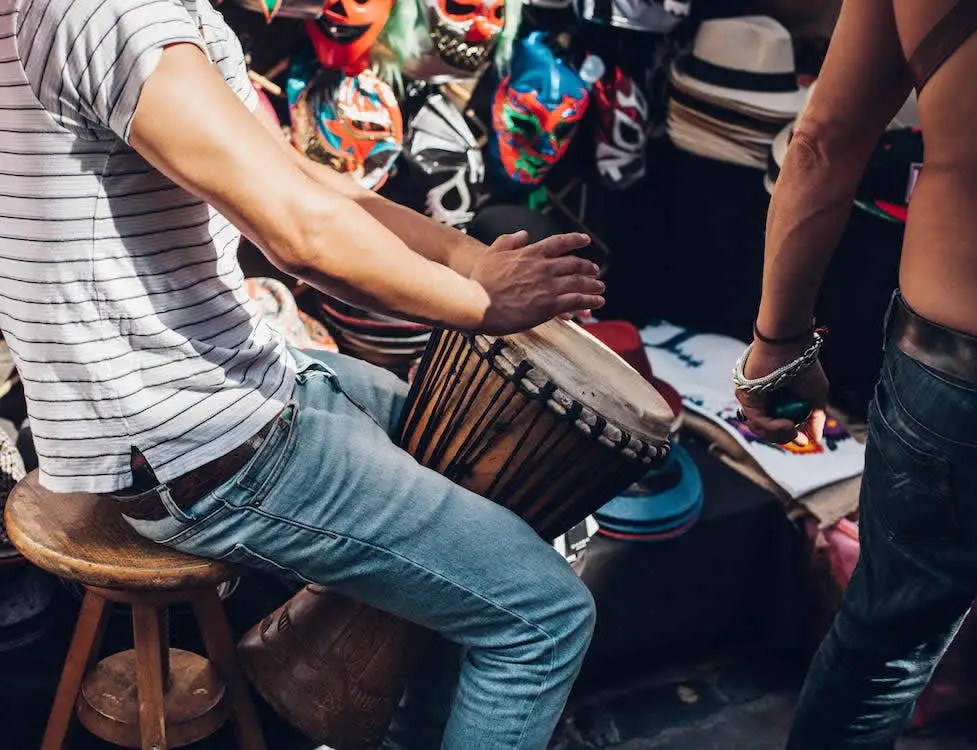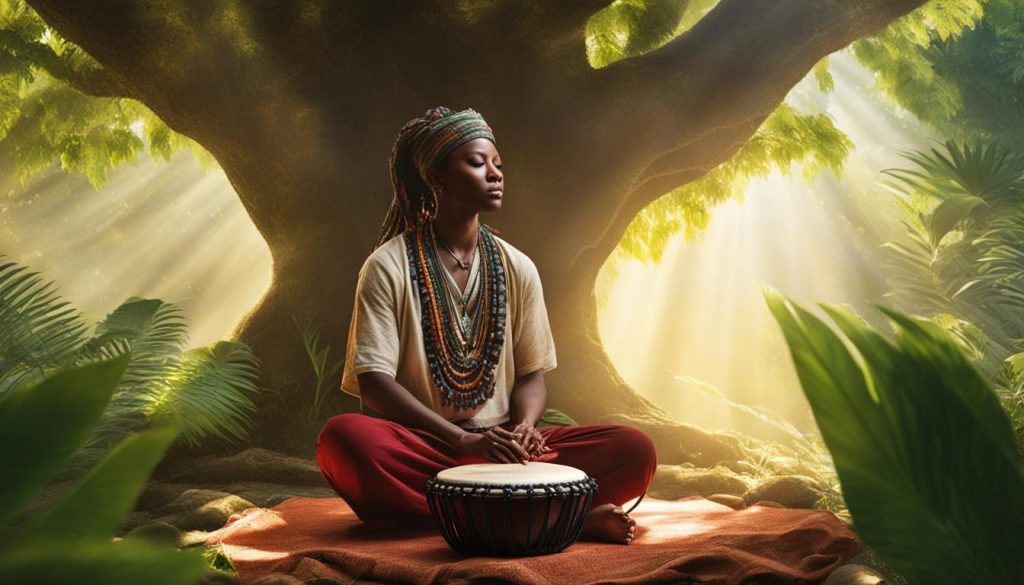The djembe is a traditional West African drum with a rich history and a reputation as a healing instrument. But, why is djembe called the healing drum?
The healing properties of the djembe extend beyond its cultural significance. Playing this drum has been found to have therapeutic effects on individuals, promoting emotional well-being and relaxation.
It can reduce stress, improve coordination, and increase the production of mood-enhancing endorphins.

Its name, “djembe,” originates from the Bamana people in Mali, who used the phrase “Anke dje, anke be” to gather their community together.
This translates to “everyone gathers together,” highlighting the drum’s purpose of uniting people in peace and harmony.
The djembe, believed to be created by the Mandé people during the Malian Empire, is made from a single piece of African hardwood and features a goatskin drumhead.
Its unique construction allows it to produce a wide variety of sounds, making it popular in drum circles and therapeutic settings.
In this article, we will explore the traditional uses of the djembe drum, its therapeutic effects, its impact on emotional well-being, its cultural significance, and the benefits of playing this instrument. Discover why the djembe is rightfully called the healing drum.
Content
The Traditional Uses of the Djembe Drum
The djembe drum holds a significant role in the spiritual and cultural practices of West African tribes. It has been utilized for centuries in various ceremonies and celebrations to mark important occasions such as the cycles of the moon, harvests, marriages, births, and deaths.
The powerful rhythm produced by the djembe drum is believed to have a profound effect on individuals, both physically and spiritually.
One of the traditional uses of the djembe drum is its association with healing practices.
In many West African tribes, healers would incorporate the drum into their healing rituals, believing that the vibrations and rhythms produced by the drum could calm patients, promote healing, and even drive away negative energies.
The djembe drum’s unique sound is said to resonate with the body, creating a sense of harmony and balance.
According to African beliefs, the djembe drum carries the spirits of the tree from which it was crafted, the animal whose skin is played, and the maker of the drum. These spirits are thought to contribute to the drum’s healing properties and its ability to bring people together.
Playing the djembe drum in a communal setting is seen as a way to connect with these spirits, fostering a sense of unity, peace, and spiritual well-being.
The Spiritual Healing Power of the Djembe Drum
In addition to its traditional uses in healing practices, the djembe drum is also utilized for spiritual healing.
The rhythmic patterns created by the drum are believed to have a profound impact on an individual’s spiritual journey. The repetitive beats can induce a meditative state, allowing individuals to connect with their inner selves and access deeper levels of consciousness.
The djembe drum serves as a powerful tool for spiritual exploration and self-expression.
Through playing the drum, individuals can release their emotions, unlock their creativity, and connect with higher realms of existence. The drumming experience is often seen as a form of prayer and a way to communicate with the divine.
The djembe drum, with its rich history and cultural significance, continues to be a revered instrument in West African traditions.
Its traditional uses in healing and spirituality highlight the deep connection between music, culture, and holistic well-being.
The Therapeutic Effects of Playing the Djembe
Playing the djembe drum offers a range of therapeutic effects, making it an excellent tool for relaxation and stress relief.
The rhythmic patterns created when playing the djembe can induce a state of relaxation by synchronizing the brainwaves and promoting a sense of calm.
The repetitive beats help to regulate breathing and heart rate, leading to a reduction in stress and anxiety levels.
Djembe drumming also promotes physical movement, which can improve coordination and motor skills.
The act of playing the drum requires the use of both hands in a coordinated manner, enhancing hand-eye coordination and fine motor skills.
Furthermore, drumming has been shown to increase the production of endorphins, the body’s natural painkillers and mood enhancers.
This release of endorphins can boost mood, alleviate pain, and enhance overall well-being.
Playing the djembe in a group setting amplifies its therapeutic effects. The collective rhythm and harmony created within a drum circle or community setting foster a sense of unity, connection, and belonging.
It creates a supportive and inclusive space where individuals can connect with others and share in the joy of music-making.
In addition, playing the djembe provides a powerful outlet for self-expression and emotional release.
The drum allows individuals to communicate their innermost emotions and thoughts without the need for words, enabling a deeper connection with oneself and others.

| Therapeutic Effects of Playing the Djembe | Description |
|---|---|
| Promotes Relaxation | The rhythmic patterns of djembe drumming induce a state of relaxation, reducing stress and anxiety. |
| Improves Coordination | Playing the djembe enhances hand-eye coordination and fine motor skills through coordinated movements. |
| Boosts Mood | Drumming increases the production of endorphins, enhancing mood and overall well-being. |
| Fosters Unity and Connection | Playing the djembe in a group setting creates a sense of unity, connection, and support. |
| Provides Emotional Release | The djembe serves as an outlet for self-expression and emotional release. |
The Djembe Drum and Emotional Well-being
The djembe drum has a profound impact on emotional well-being. Playing the djembe can help individuals express and release their emotions in a safe and nonverbal way.
The rhythmic vibrations produced by the drum can resonate with the body and promote a sense of grounding and stability.
The act of playing the djembe can also help individuals connect with their inner selves and cultivate a sense of mindfulness and presence. This can lead to a reduction in anxiety, depression, and other negative emotions.
The communal aspect of playing the djembe in a group setting can increase feelings of belonging and improve overall psychological well-being.
In addition to its cultural significance, the djembe drum offers a range of therapeutic benefits for individuals seeking emotional release, stress reduction, and self-expression.
Through the rhythmic beats and vibrations, the djembe drum provides a powerful means of connecting with one’s emotions and finding inner peace.
The Cultural Significance of the Djembe Drum
The djembe drum holds immense cultural significance in West Africa. It is not just an instrument but also a symbol of love, emotion, spirituality, and life.
In many African cultures, the djembe is played only by those who are born into djembe-playing families, and it is considered their instrument and sometimes their job to play the drum for the community.
The drum is often associated with specific castes, such as the jeli caste, who are responsible for the oral history and music of their people.
The djembe drum has a rich and storied history, with legends surrounding its origin and the craftsmanship involved in its creation.
It continues to be a cherished instrument in traditional ceremonies and celebrations, as well as in modern music and dance.
Cultural Significance of the Djembe Drum in West Africa
| Significance | Examples |
|---|---|
| Symbol of Unity | The djembe drum brings people together in peace and harmony during ceremonies and rituals. |
| Expression of Tradition | Being born into a djembe-playing family signifies a deep connection to the cultural heritage. |
| Carrier of Oral History | The jeli caste utilizes the djembe drum to preserve and share the traditions and stories of their people. |
| Musical and Dancing Accompaniment | The djembe drum is an integral part of traditional West African music and dance performances. |
| Spiritual Significance | The drum is believed to embody the spirits of the tree, the animal, and the drum maker, enhancing its healing properties and sacredness. |
Conclusion
The djembe drum, known as the healing drum, has a profound impact on individuals’ emotional well-being and offers various therapeutic benefits.
Playing the djembe enables you to reduce stress, find relaxation, and enhance coordination and motor skills.
Additionally, it serves as a powerful tool for self-expression and emotional release. When played in a group setting, the djembe fosters a sense of unity and connection among participants, creating a supportive and inclusive community.
Whether played for personal enjoyment or in therapeutic settings, the djembe drum continues to bring healing, joy, and a profound sense of belonging to people across the globe.
Its ability to promote emotional well-being and create a sense of community makes it a truly remarkable and influential instrument.
